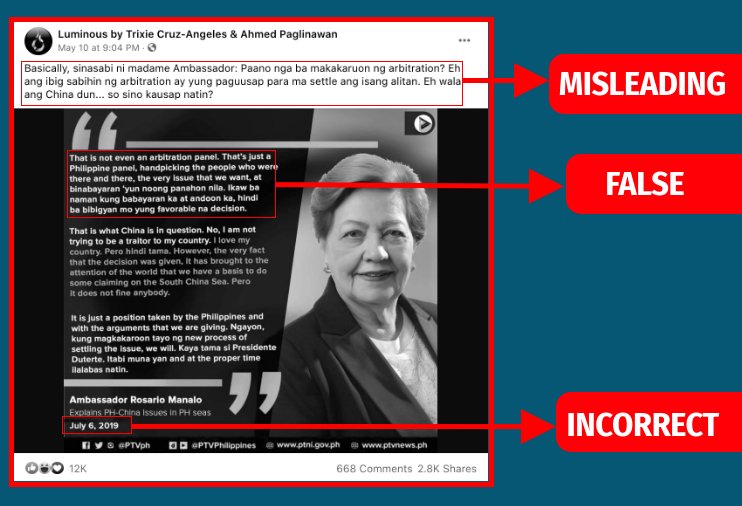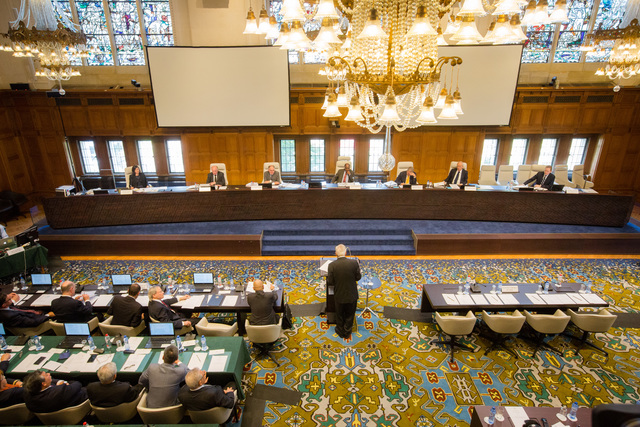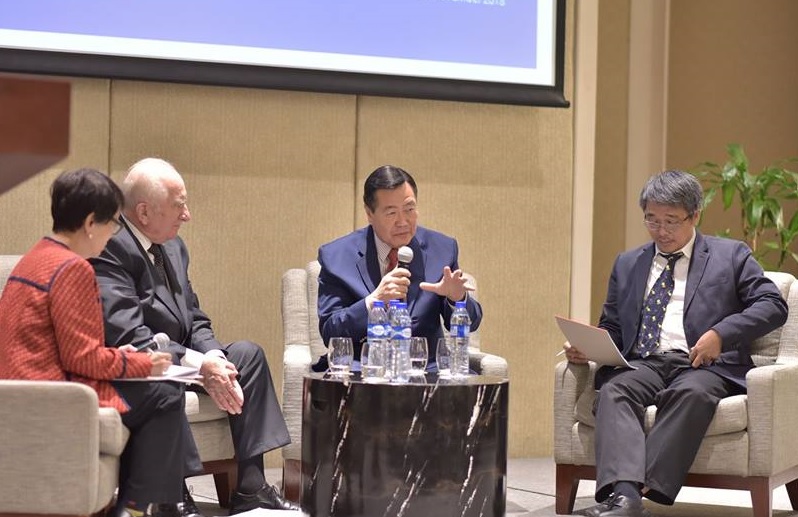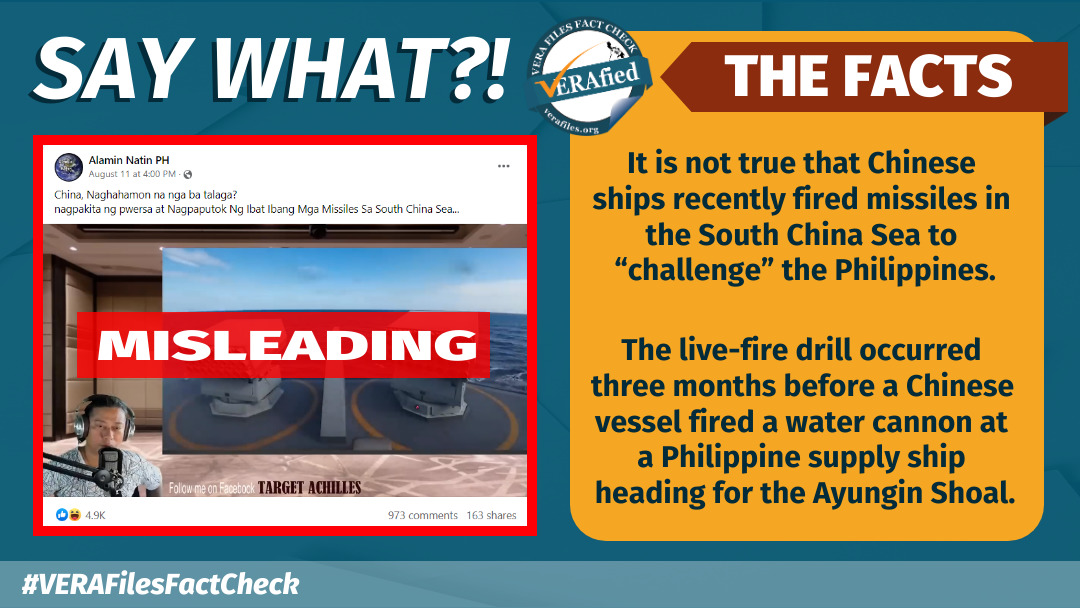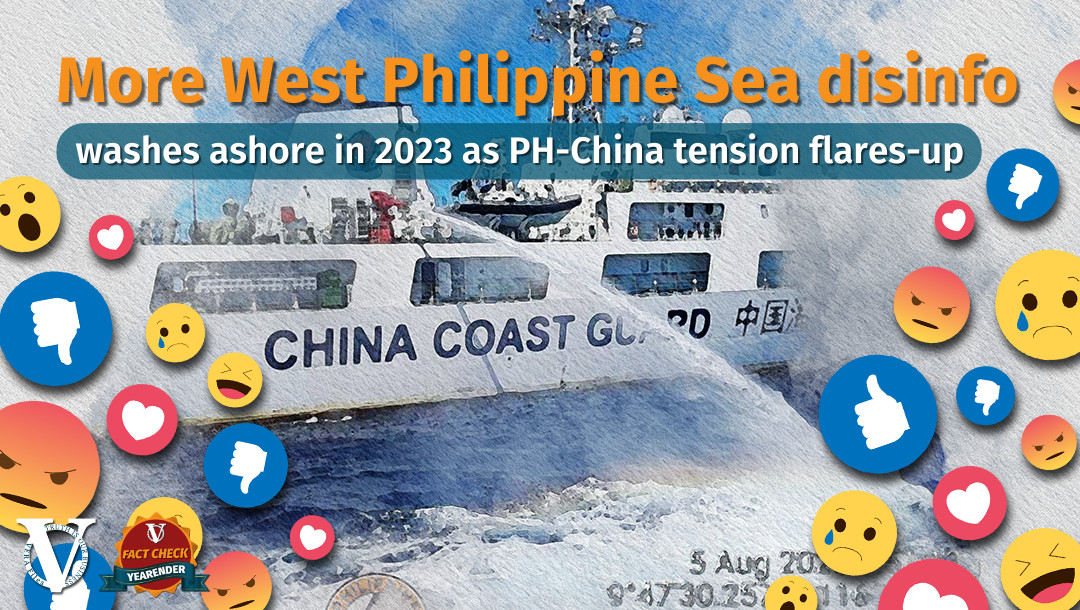People’s Television (PTV) News, a state-run media network, posted a misdated quote card of former ambassador Rosario Manalo, in which the latter inaccurately claimed that the Philippines “handpicked” the arbitration panel in the South China Sea maritime dispute with China.
The quote card was then amplified by a Facebook page managed by two pro-Duterte lawyers, further insinuating that China’s nonparticipation delegitimized the arbitration proceedings.
STATEMENT
On May 10, PTV posted a quote card of Manalo, supposedly dated July 6, 2019, commenting on the case the Philippines filed against China on the South China Sea dispute, in which the Permanent Court of Arbitration (PCA) served as the “registry.”
The quote card reads in part:
“That is not even an arbitration panel. That’s just a Philippine panel, handpicking the people who were there and there, the very issue that we want, at binabayaran ‘yun noong panahon nila (and that was paid at that time). Ikaw ba naman kung babayaran ka at andoon ka, hindi ba bibigyan mo yung favorable na decision? (If you would be paid to appear there, wouldn’t you give a favorable decision)?”
Source: PTV official Facebook page, READ: Retired Ambassador Rosario Manalo explains PH-China issues in Philippine seas, May 10, 2021 (Original link)
Manalo, now a member of the United Nations (UN) Committee on the Elimination of Discrimination Against Women, added that the ruling “does not [bind] anybody” and is “just a position taken by the Philippines.”
A little over three hours later, Facebook page Luminous by Trixie Cruz-Angeles & Ahmed Paglinawan uploaded the PTV quote card with the caption:
“Basically, sinasabi ni madame Ambassador: Paano nga ba makakaruon (sic) ng arbitration? Eh ang ibig sabihin ng arbitration ay yung paguusap (sic) para ma settle ang isang alitan. Eh wala ang China dun … so sino kausap natin?”
(Basically, madame Ambassador was saying: How can there be an arbitration? Arbitration means there was a discussion to settle disagreements. But China wasn’t there … so whom did we talk to?)
Source: Luminous by Trixie Cruz-Angeles & Ahmed Paglinawan Facebook page, Basically, sinasabi ni madame …, May 10, 2021 (Original link)
FACT
Contrary to Manalo’s claim, the Philippines did not handpick all of the arbitrators in the five-member arbitral panel. It followed the appointment process laid out in the UN Convention on the Law of the Sea (UNCLOS) — to which both the Philippines and China are parties — as noted by the arbitral tribunal in its Award on Jurisdiction and Admissibility.
Under Annex VII of UNCLOS, parties in an arbitration case may each choose an arbitrator from a list “drawn up and maintained” by the UN secretary-general to join the arbitration panel, which is one of the prescribed venues to settle disputes under the Convention. The remaining three members are then “appointed by agreement” between the parties. Since China refused to participate in the proceedings, it was not able to do either.
Thus, in accordance with the Convention, the Philippines asked the International Tribunal for the Law of the Sea (ITLOS) — an “independent judicial body” established by UNCLOS — to appoint the arbitrator for China, and the remaining three panel members.
Moreover, China’s deliberate nonparticipation in the proceedings did not hamper the arbitral tribunal from hearing and rendering judgment on the case filed by the Philippines.
Article 9, Annex VII of the Convention explicitly stated that “absence” or “failure” of a party to defend its case “shall not constitute a bar to the [arbitration] proceedings.”
It further instructs the arbitration panel to “satisfy itself not only that it has jurisdiction over the dispute but also that the claim is well founded in fact and law” before making its award on the case.
In its Award on Jurisdiction and Admissibility, the tribunal held that:
“…the non-participation of China does not bar this Tribunal from proceeding with the arbitration. China is still a party to the arbitration, and … shall be bound by any award the Tribunal issues.”
Source: Permanent Court of Arbitration, Award on Jurisdiction and Admissibility, Oct. 29, 2015
The Philippines filed the arbitration case against China in January 2013, seven months after a standoff that lasted two months ensued between the two countries over the disputed Scarborough Shoal (locally called Panatag Shoal or Bajo de Masinloc), a traditional fishing ground located in the South China Sea. (See VERA FILES FACT CHECK: Three things Duterte got wrong on the PH-China maritime standoff)
It asked the tribunal to invalidate, among others, China’s expansive “nine-dash line” claim covering almost the entire South China Sea, within which is the West Philippine Sea. (See Primer on the PH-China Arbitration)
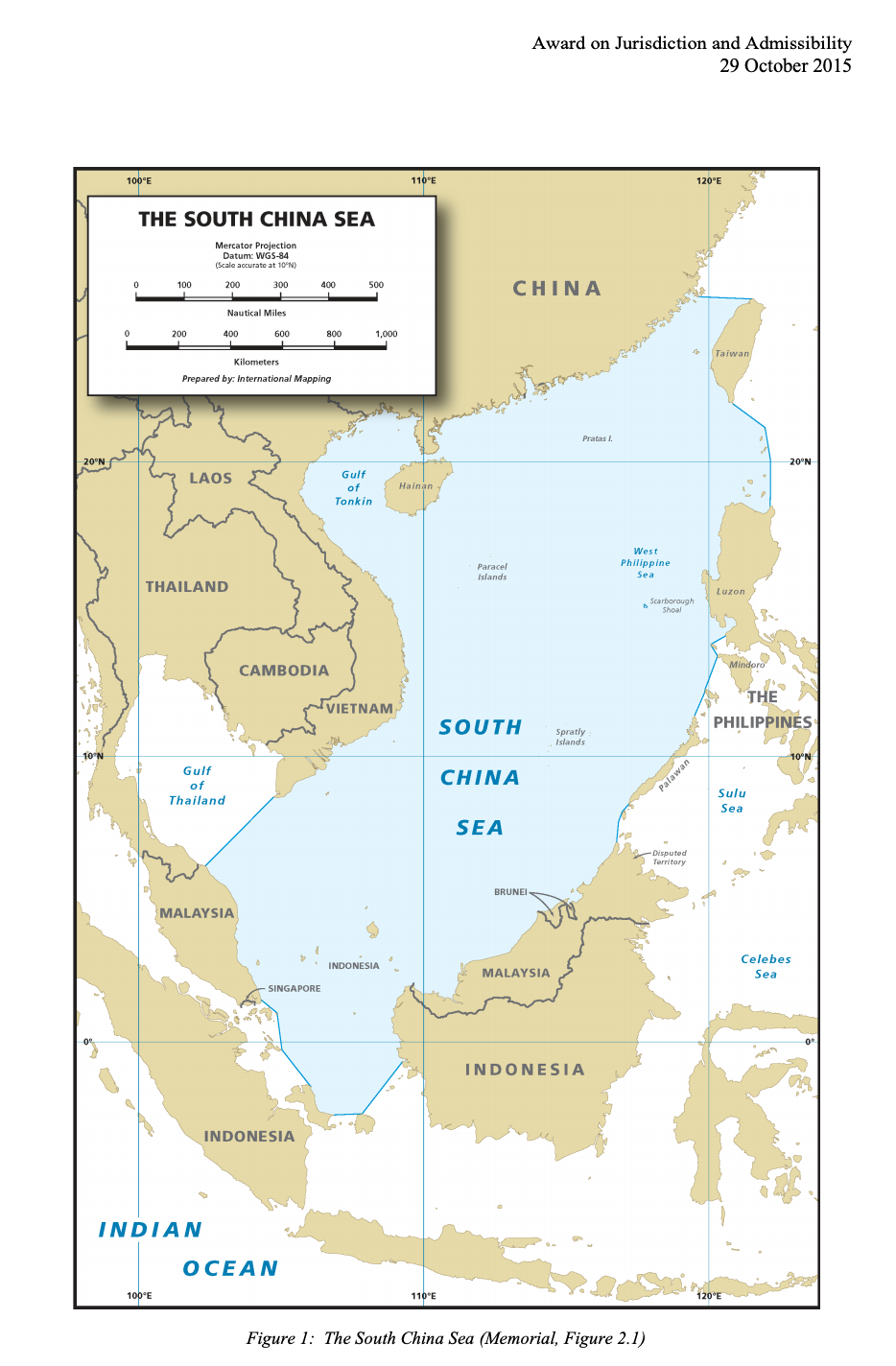
A map of the South China Sea. Screenshot from the Award on Jurisdiction and Admissibility on the Philippine arbitration case against China, uploaded in the Permanent Court of Arbitration’s website.
In its 501-page award on the merits of the case issued in July 2016, the arbitration panel reiterated that it had jurisdiction on the dispute despite China’s “non-appearance” in the proceedings.
The tribunal said it did not “simply accept the evidence and claims of the participating party (Philippines) by default,” and further enumerated some of the measures it took to “safeguard the procedural rights of China.”
The panel said it took note of the position paper issued in December 2014 by China’s foreign ministry, saying it does not recognize the Philippines’ recourse to arbitration and the tribunal’s jurisdiction; public statements by Chinese officials on the matter; and, communications received from China’s ambassador to the Netherlands, where the PCA is based.
The Philippines also had to shoulder China’s share of the costs of the arbitration, given the latter’s nonparticipation, as required under UNCLOS.
On July 12, 2016, the arbitration panel handed down its “final and binding” award, which held that China’s “nine-dash line” claim has “no legal basis.”
The tribunal also declared, among others, that China had violated the Philippines’ sovereign rights in its exclusive economic zone by interfering with the latter’s fishing and oil exploration, constructing artificial islands, and failing to prevent Chinese fisherfolk from operating in the area.
Wrong date
Meanwhile, PTV wrongly attributed the date of Manalo’s statement in its May 10 quote card and in a news article it published on the same day, in which it claimed that the former ambassador made the statement on July 12, 2019.
However, VERA Files Fact Check found, through a thorough research using Google Advanced Search, that Manalo originally made the claim during a “Tapatan sa Aristocrat” media forum on Oct. 16, 2017.
Sources
Luminous by Trixie Cruz-Angeles & Ahmed Paglinawan Facebook page, Basically, sinasabi ni madame … , May 10, 2021 (Original link)
Luminous by Trixie Cruz-Angeles & Ahmed Paglinawan Facebook page, Personally, I will support…, Aug. 23, 2020
Luminous by Trixie Cruz-Angeles & Ahmed Paglinawan Facebook page, Mas maigi …, April 12, 2021
PTV, READ: Retired Ambassador Rosario Manalo explains PH-China issues in Philippine seas., May 10, 2021 (Original link)
PTV, Former Amb. Manalo: Arbitration on WPS “not set up correctly”, , May 10, 2021 (Original link)
United Nations, Membership of the Committee on the Elimination of Discrimination against Women, Accessed May 21, 2021
Permanent Court of Arbitration, The South China Sea Arbitration (The Republic of Philippines v. The People’s Republic of China), Accessed May 25, 2021
Permanent Court of Arbitration, THE SOUTH CHINA SEA ARBITRATION (THE REPUBLIC OF THE PHILIPPINES V. THE PEOPLE’S REPUBLIC OF CHINA), July 12, 2016
United Nations, United Nations Convention on the Law of the Sea, Accessed May 21, 2021
United Nations, Status of the UNCLOS, Accessed May 21, 2021
Permanent Court of Arbitration, About Us, Accessed May 21, 2021
Permanent Court of Arbitration, Award, July 12, 2016
Permanent Court of Arbitration, Award on Jurisdiction and Admissibility, Oct. 29, 2015
Scarborough Shoal standoff
- Official Gazette, Philippine position on Bajo de Masinloc (Scarborough Shoal) and the waters within its vicinity, April 18, 2012
- Inquirer.net, What Went Before: Panatag Shoal standoff, April 21, 2021
- Reuters, Philippines pulls ships from disputed shoal due to weather, June 16, 2012
- GMA News Online, A year after Panatag stand-off, shoal firmly controlled by China, April 23, 2013
International Tribunal for the Law of the Sea, INTERNATIONAL TRIBUNAL FOR THE LAW OF THE SEA, Accessed May 25, 2021
Areopagus Communication, Is ASEAN still relevant?, Oct. 29, 2017
(Guided by the code of principles of the International Fact-Checking Network at Poynter, VERA Files tracks the false claims, flip-flops, misleading statements of public officials and figures, and debunks them with factual evidence. Find out more about this initiative and our methodology.)
